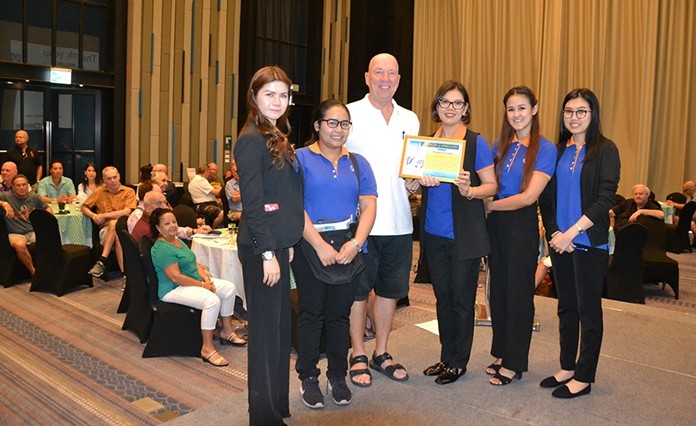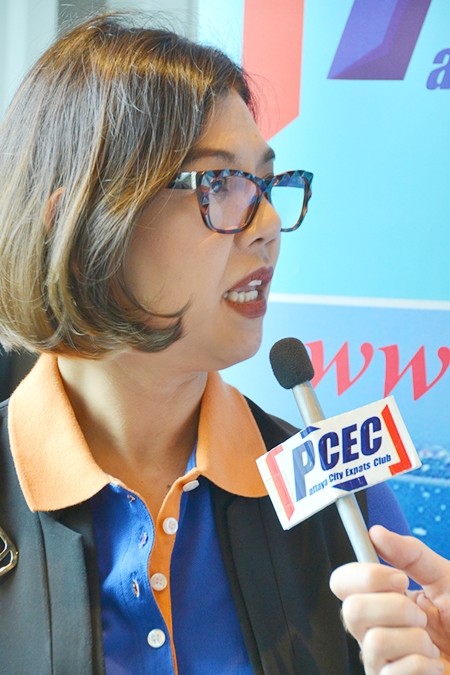
The Pattaya City Expats Club, at their meeting on Sunday 10th February, gave a very warm welcome to Waraporn Srinaka and her team of colleagues from Bangkok Bank.
Waraporn is a Senior Specialist in the Foreign Customer Segments Division of the Global Payments Department of Bangkok Bank, thus she was able to provide PCEC members with a range of banking advice and solutions.
She joined Bangkok Bank’s Private Banking Division at their Head Office in 1993, initiating her highly distinguished professional career in the banking sector. After a few years, she joined her family in pursuing an overseas career, living in various countries before rejoining Bangkok Bank in 2005 as an Account Manager, Property Financing, in Singapore.
After 15 years of living overseas as an expatriate, and a few years at Bank Head Office to further enhance her skills in Business Development and Channel Marketing, she was put in charge of expatriate Banking Projects and Expat Financial Schemes. During her career, she has received many commendations, which make her a highly respected banking professional amongst her peers.
As a former expatriate herself, Waraporn possesses a unique insight into the banking issues and challenges faced today by expats throughout Thailand.
Waraporn first introduced herself and her team, which included colleagues from the Head Office and from these branches: Soi Buakhao Pattaya, Pratamnak Road and Jomtien Beach, Second Road Pattaya, Pattaya Beach, Boonthavorn Sukhumvit and Walking Street Pattaya.
She explained that, when thinking about sending or receiving money from overseas, you need to pay attention to the currency exchanges rates. With Bangkok Bank, you can set up a foreign currency deposit account. This is useful for foreigners who would like to hold incoming foreign funds without needing to immediately convert the money to Thai Baht.
These accounts are available as both foreign individual and joint accounts, and as savings accounts or, for some currencies, fixed-term accounts giving higher interest. There is no limit to the maximum deposit balance and you can change the money into Thai baht at any time and at a favourable rate.

No documents are required when you withdraw funds or transfer money overseas. A Foreign Currency Deposit account does not have any restrictions on the withdrawal of funds, and it is eligible for the requirements at immigration to obtain a Thai visa or extend a Permission to Stay. For more information on the deposit and withdrawal terms and conditions and fees, you can pick up a brochure at any Bangkok Bank Branch in Pattaya.
Foreigners can also invest in a fixed/time deposit account and enjoy higher interest than a normal savings account; these accounts also satisfy the requirements at immigration to obtain a Thai visa or extend a Permission to Stay.
She added that altogether Bangkok Bank has 32 overseas branches – the largest overseas branch network of any Thai bank. Therefore many customers can transfer funds using the bank’s overseas relationship networks, and they will then benefit from receiving their money faster, more securely and with lower fees.
Waraporn was also keen to point out that foreigners can transfer money both into and out of Thailand. She advised foreigners who transfer money into Thailand and wish to repatriate such funds out of Thailand at a future date, that they must keep the documents showing evidence of the money transfer into Thailand, such as a credit advice, which can be requested at the bank where the foreigner holds their bank account.
She also suggested that, when transferring money into Thailand they can avoid delays if they supply all the following information: their bank’s Swift Code, which for Bangkok Bank is BKKBTHBK; the bank account name and number; the address in Thailand; the preferred currency; the purpose of the money transfer into Thailand.
Foreigners can also transfer money out of Thailand: this may come from their condominium investments, income earned in Thailand, or money brought into Thailand. For such a transfer, the bank will ask the customer for evidence of the origin of the money transfer, such as an employer‘s letter for the income earned in Thailand, the credit advice from when the money was brought into Thailand, or the sale agreement and title deed for a condominium investment.
Waraporn also explained the upcoming changes for use of Bangkok Bank’s New York Branch to send money to Thailand. An outline of these changes can be found on the club’s newsletter on their web site.
She ended her presentation by answering questions from club members. After this, she was thanked for her comprehensive talk, and presented with the Club’s certificate of appreciation.
During the Q & A session, the Bangkok Bank staff handed out a survey form to all the members.
 |
 |





